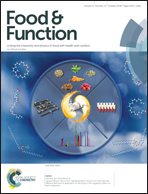Inhibition by microbial metabolites of Chinese dark tea of age-related neurodegenerative disorders in senescence-accelerated mouse prone 8 (SAMP8) mice†
Abstract
Dark tea has a significant effect on the prevention and treatment of age-related degenerative diseases. At present, further exploration of its functional mechanisms is delayed because of the complexity of post-fermentation microbial metabolites during the production phase. In this study, new isolated microbial metabolites extracted from dark tea were used to explore the neuroprotective effects, and they also helped allow further exploration of the mechanism of dark tea. Taking senescence-accelerated mouse prone 8 (SAMP8) mice as a biological model, we examined the protective effect on brain neurons of post-fermentation microbial metabolites which were extracted from dark tea. The 4-month-old mice were given treatments of the same concentration (10 mg kg−1 d−1) which were L-theanine, 3,3′-azanediylbis(4-hydroxybenzoic acid) (CDT-1) and one of the 8-C N-ethyl-2-pyrrolidinone substituted flavan-3-ols (CDT-2) by gavage for 14 weeks. Relative measurements such as RT-PCR, ELISA, western blotting, and section staining (HE, Nissl and myelin) were carried out. The results showed that L-theanine, CDT-1 and CDT-2 could inhibit the decrease in body weight, and down-regulate the formation of 4-HNE and ubiquitinated protein aggregates and the Aβ metabolic pathway. They could also increase endogenous antioxidant capacity, relieve cell hypoxia, and reduce the rate of neuronal apoptosis. This means that their protective activity regarding SAMP8 neurons was excellent and the activity of CDT-2 was the most significant.



 Please wait while we load your content...
Please wait while we load your content...